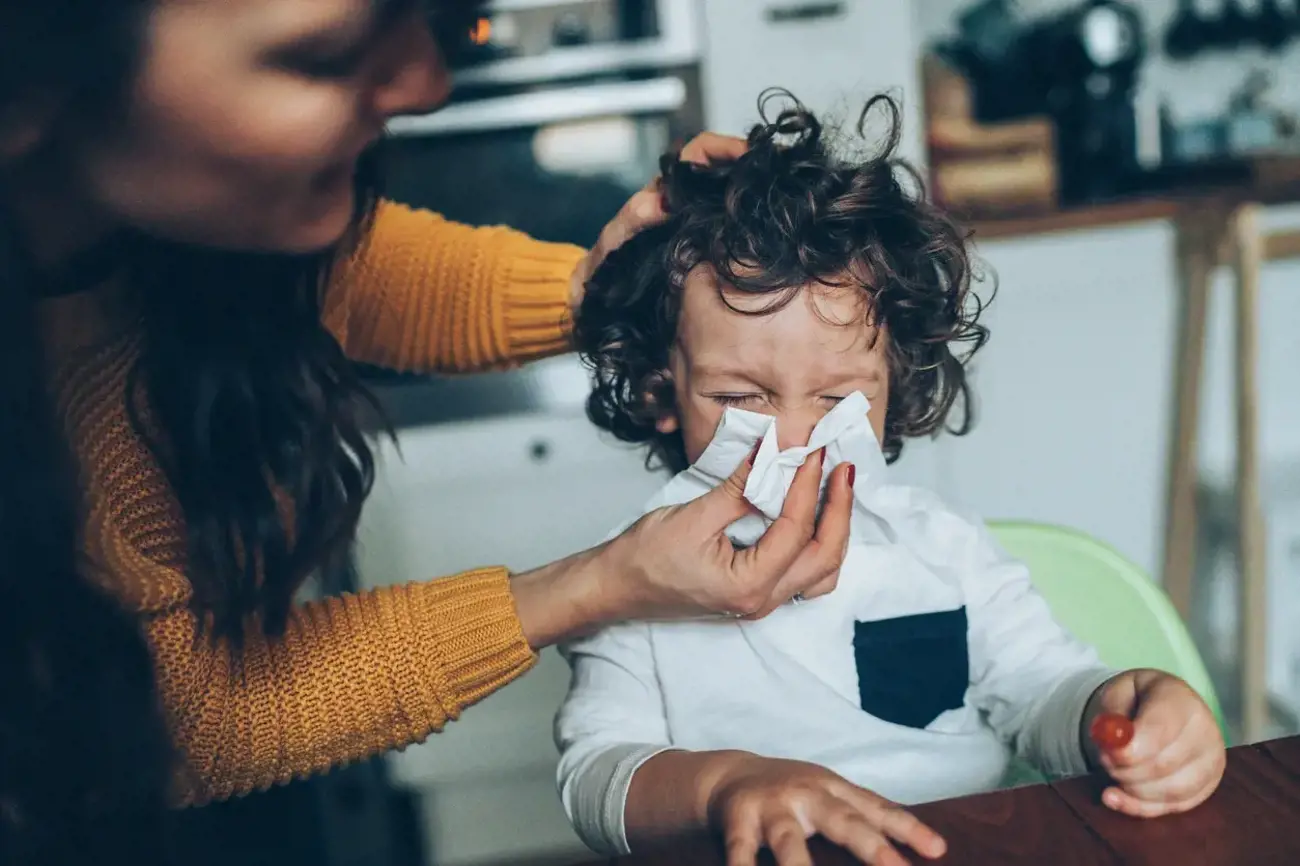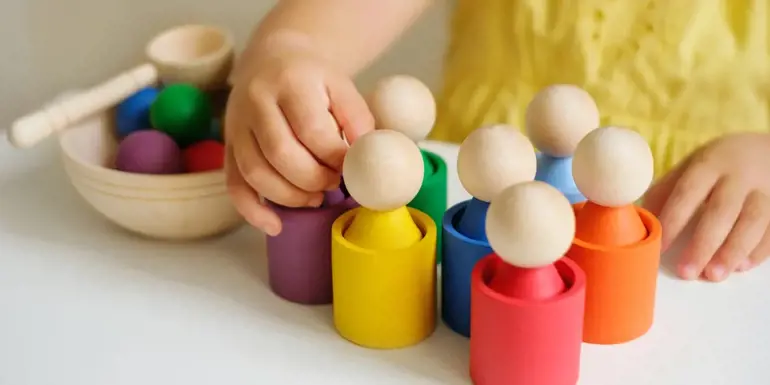If you've enrolled your child in ELC or preschool, you've likely experienced the infamous cycle of childhood illnesses. It can be overwhelming, but we're here to hold your hand through it. We've teamed up with expert paediatrician Dr Lexi to empower you with the knowledge and strategies to navigate sickness confidently.
Why Do Kids in Daycare Get Sick So Often?
It's no secret that children attending daycare or preschool seem to catch every bug in town. According to Dr Lexi, it's very common, and there's even a term for them - "Superspreaders."
Here's why it happens:
Perfect Germ Environment:
Early Learning Centres provide the perfect breeding ground for germs. Crowded rooms, curious hands exploring mouths and noses, and shared toys and tables create an ideal environment for spreading illnesses.
Immature Immune Systems:
Children's immune systems are still developing and don't fully mature until they are 7-8 years old. This makes them more susceptible to infections, especially when they're exposed to bugs from other kids.
Exposure to Infections:
Children often share toys, wipe their noses, and touch surfaces, increasing their exposure to germs. So, it's no surprise that, on average, children under five experience 10-12 infections per year, almost one per month.
Common Daycare Illnesses and How They Spread
Dr Lexi explains that viral infections are more common than bacterial ones in daycare settings. Here are some typical illnesses children often contract:
Respiratory Infections:
This includes the common cold (rhinovirus), chest infections (e.g., RSV causing bronchiolitis), and the flu.
Gastro Infections:
Stomach bugs can spread like wildfire.
Skin Infections:
Hand, foot, and mouth disease, slapped cheek, and impetigo can easily make their rounds.
Parasites:
Worms and head lice can also become unwelcome visitors.
Why Some Kids Get Sick More Than Others
Understanding your child's susceptibility to illnesses can help. Dr Lexi emphasises that several factors play a role:
Immune System Development:
Babies initially receive immunity from their mothers, but this protection wanes after six months, leaving them more susceptible.
Exposure to Infections:
Children exposed to more germs, both at daycare and at home, have the opportunity to build stronger immune systems. Every time your baby or child gets sick, they develop their immune system and learn how to fight infections if they meet them again. I know it's tough when you're in the thick of it, but try to consider this a positive thing to build your child's immunity.
Underlying Health Conditions:
Any pre-existing health conditions can affect a child's susceptibility. Premature infants are also at a higher risk of infections.
Boosting Your Child's Immune System
Now, the million-dollar question: How can parents support their child's immune system before daycare? Dr Lexi offers some simple yet effective strategies:
- Nutrition: Ensure your child enjoys a healthy and varied diet.
- Sleep: Prioritise good sleep habits.
- Sunlight: Balance sun exposure for adequate Vitamin D (while staying sun-smart).
- Fresh Air and Exercise: Encourage outdoor play and physical activity.
- Parental Wellbeing: Your stress levels can affect your child's immune system, so take care of yourselves too.
- Exposure to Infections: Unless your child has a rare immune condition, exposure to infections helps their immune system develop.
- Immunisations: Keep current with recommended vaccines for your child and your family.
Maintaining Hygiene to Minimise Risk
In the wake of COVID-19, we know how important good hygiene is. Dr Lexi offers practical tips:
- Keep your child home from daycare if they're sick.
- Avoid contact with unwell individuals and practice social distancing.
- Teach kids to wash hands regularly or use hand sanitiser.
- Encourage coughing and sneezing into elbows or tissues.
- No sharing of cups, cutlery, or toothbrushes when sick.
- Use hot, soapy water to clean items your child may have mouthed or touched when sick.

When to Keep Your Little One at Home
Balancing work and childcare can be challenging, but Dr Lexi advises keeping your child home if they display these symptoms:
- Fever
- Signs of respiratory tract infections
- Trouble breathing
- Vomiting or diarrhoea
- Rash
- Infection or exposure to a contagious disease
- Pain
- Lethargy or fatigue
Your childcare centre or ELC will have policies and guidelines for illness. Make sure to check with them before returning your child to daycare.

Managing Illness and When to Seek Medical Help
When your child does get sick, Dr Lexi recommends:
- Staying home from daycare if unwell
- Ensuring proper hydration
- Resting
- Administering pain relief if necessary
- Maintaining good hygiene practices
- Monitoring symptoms
If their illness doesn't improve within 48 hours or if they experience any of the following symptoms, it is recommended that you consult a GP:
- Severe or persistent pain that does not respond to paracetamol or ibuprofen
- Persistent vomiting and diarrhoea
- A fever that does not improve after 48 hours
- Refusal to drink or signs of dehydration
- Minimal wet nappies in infants
- A rash or spot that does not turn white when you press on it
- Poor feeding or fever in any infant under three months of age.
The following signs and symptoms are red flags, and you should seek urgent care from a GP or emergency department:
- Very pale, lethargic, difficult to wake
- Significant breathing difficulties
- Rash, headache, stiff neck or back pain
- Unwell with fever
- A non-blanching rash
- Poor feeding or a fever in an infant under one month of age
If you are feeling worried, trust your instincts and seek medical assistance.

Communication with Daycare Providers
Open and honest communication with daycare providers is crucial. If your child is unwell, let them know. This helps prevent outbreaks and ensures your child can return safely once they're better.
Resources for Further Education
For more information on child health and illness prevention, Dr Lexi recommends these resources:
Royal Children's Hospital Melbourne - Viral Illnesses
Royal Children's Hospital Melbourne - Stopping the Spread of Germs
New South Wales Health - Childhood Infections
Surviving Sickness Course
If you feel overwhelmed and unsure how to navigate sickness in your children, we have created a course for you. Our Surviving Sickness course, developed with Dr Lexi and Nikki Jurcutz as co-presenters, will teach you how to confidently handle any illness that comes your way.
At Tiny Hearts, we're here to empower you with knowledge and tools to navigate the ups and downs of parenting. Remember, you've got this, and we're here to support you every step of the way.
Originally written for Tiny Hearts by Dr Lexi Frydenberg (Instagram or LinkedIn)



































